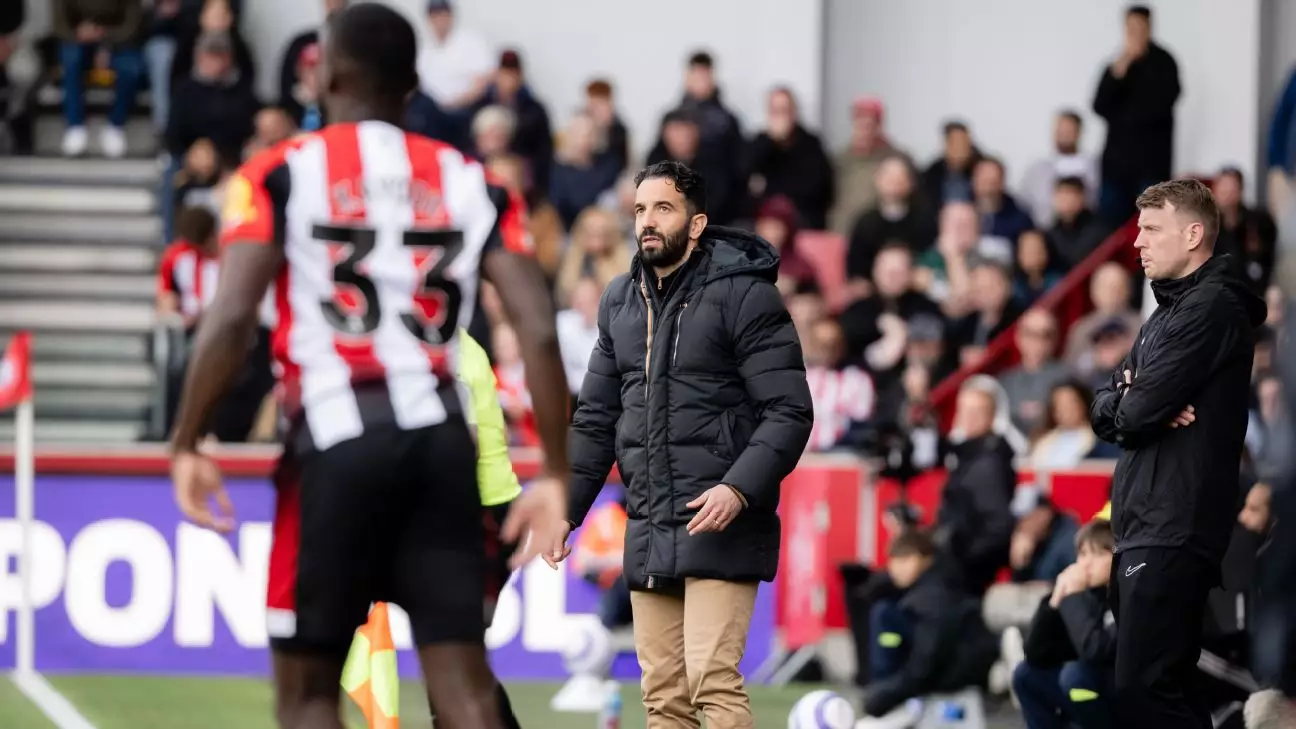Manchester United’s latest venture under the guidance of head coach Ruben Amorim has presented a complex tapestry of highs and lows. The recent 4-3 defeat against Brentford epitomizes not merely a failure on the pitch, but reveals the broader struggles that have beset the club this season. Amorim, expressing a disconcerting premonition of his team’s struggles, hinted at the tactical disparities that became evident even before the first whistle blew. The defeat marks a staggering 16 losses in the Premier League, a heavy burden for anyone who hopes to steer this once-mighty football institution back to its glory days.
What stood out during this encounter was the sheer physicality and tactical acumen of Brentford, starkly contrasting with Manchester United’s vulnerability on defensive set-pieces. Each goal they conceded seemed to underline a systemic issue — the team’s lack of height and cohesion in defense. The absence of vital defensive solidity has been a recurrent theme, hampering the club’s ability to convert dominance in territory into tangible results.
The Downfall of Defensive Diligence
United may have started the game with a semblance of control, as Amorim suggested, but control in football is a double-edged sword. It was evident that having a quick start often lulls teams into a comfortable yet misleading sense of security. With Mason Mount putting United ahead, fans might have dreamt of a much-needed win, yet the predicaments that followed were distressingly familiar. Each set-piece became an invitation for disaster, with Brentford’s Mikkel Damsgaard pouncing to score an own goal off Luke Shaw due to a failure to clear the ball.
The additional goals scored by Kevin Schade, primarily through headers, served as a stark reminder of United’s aerial frailties. De Ligt’s injury, along with the referee’s controversial decision not to halt play, painted a worrying picture of the decision-making processes — both on and off the field. It is disheartening that a top-tier club like Manchester United cannot adapt or account for such scenarios. Such occurrences highlight a leadership failure, where tactics fall short of the requisite robustness needed to compete, especially against teams adept at exploiting physical advantages.
Young Blood vs. Experience
Amorim’s drastic lineup changes also provoke thought. By fielding 17-year-old Chido Obi, the youngest player to start a Premier League match for the club, and a starting XI with an average age of just over 22, Amorim is painting a portrait of a team in pivotal transition. Yet, while nurturing young talent is crucial for any team’s future, the inherent risks of relying heavily on inexperience in high-pressure situations can’t be overlooked.
The strategy behind such decisions raises vital questions regarding the club’s immediate aspirations versus long-term vision. Is this a season solely for development, or is there still a glimmer of hope for relevance in chasing higher league positions? With the Europa League semifinal looming on the horizon just a few days later, Amorim’s game plan undoubtedly gravitates towards that single objective, perhaps at the expense of short-term stability in domestic competitions.
Reflections and Future Directions
As United trudges through another turbulent season, the narrative surrounding the club evolves continuously. Amorim’s tactical choices and the recurring defensive mishaps underline a side that is wrestling with establishing its identity while grappling with the challenges that come with it. It raises an essential question: Can Manchester United, with their storied legacy, find a way to blend youth with the experience necessary to flourish in a competitive league?
The path ahead bears uncertainty, but a commitment to restructure, adapt, and innovate in their approach is crucial. For fans who yearn for a return to glory, it is disheartening to watch their beloved club falter yet again. This journey will require not just skill but resilience — traits that, at this juncture, need to be cultivated both on and off the pitch. The question is, will Amorim and his young squad rise to the occasion and learn from their missteps, or will they continue to unravel under the pressures of expectation? Time will tell if this chapter in Manchester United’s storied history becomes a tale of redemption or a cautionary story of missed opportunities.

